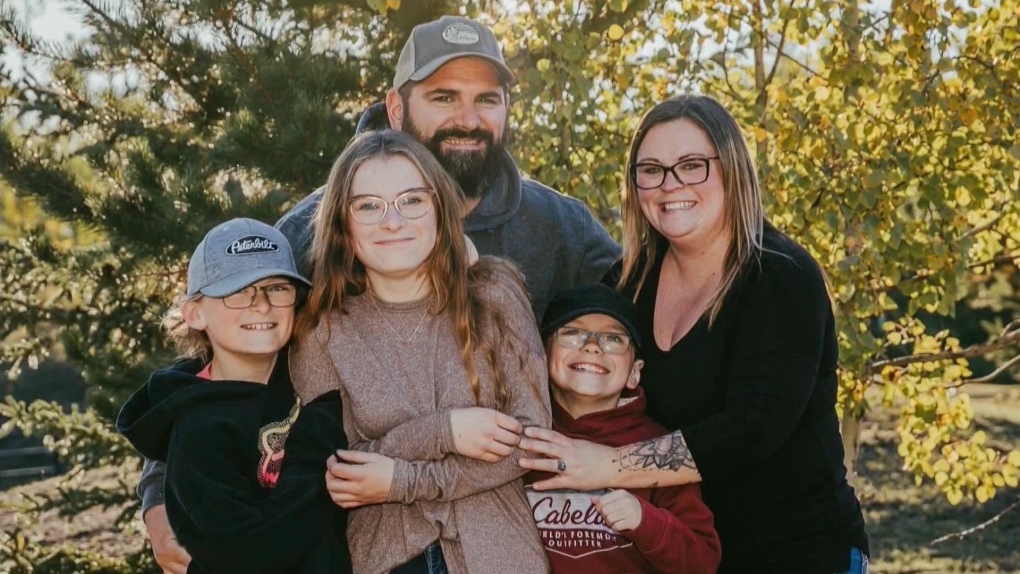Canadian family warns of the dangers of wildfire smoke after losing son
The family of a nine-year-old boy who died last summer is urging Canadians to be more mindful of the harmful effects of wildfire smoke.
Carter Vigh died of asthma exacerbated by the smoke in July 2023 in 100 Mile House, B.C.
His mom Amber says the family was aware that poor air quality was dangerous, but, like most people, didn’t understand just how bad it could be.
"People have to pay attention," Amber told CTV News. "They need to know that when there’s an air quality alert that comes out, you need to be cautious."
"By just going into your house and closing your windows and doors, you’re not necessarily keeping yourself completely safe, because that air is still coming in."
Carter, who dealt with asthma his entire life, began coughing on a summer day last year after inhaling the pollutants from wildfire smoke.
"People don’t realize," Amber said. "They think the flames are the only danger in a fire, and if the flames aren’t on your doorstep, you’re OK."
Amber and her husband have since launched Carter's Project, a partnership between the family and the B.C. Lung Foundation.
Their goal is to hand out air quality monitors and encourage Canadians to invest in air purifiers for their home.
They’ve already raised thousands of dollars for the cause, passed out more than 100 purifiers in their community and lobbied their provincial representative to introduce a private member's bill — called Carter's Law — in the B.C. legislature.
The bill aims to better air quality management and protect vulnerable people during wildfire seasons.
"The main reason we’ve pushed this so much is so no other family has to go through what we’ve gone through," Vigh said.
 Carter Vigh died of asthma exacerbated by the smoke in July 2023 in 100 Mile House, B.C.
Carter Vigh died of asthma exacerbated by the smoke in July 2023 in 100 Mile House, B.C.
Smoke incoming
Wildfire season this year, while so far not as bad as 2023’s record-breaker, is projected to be especially rough.
Poor air quality is on the docket, according to experts, and historical data suggests that it will likely be the case for the foreseeable future.
Environment and Climate Change Canada data shows since 2014, the annual average of smoky hours from May to September has been about 192.
That’s monumental stacked up against the same period from 1981 to 2000 — which, on average, saw just 12 hours of smoke per year.
That’s led to a rise in cardiac and respiratory hospital admissions, as well as lung and brain cancer reporting.
Seniors, those who are pregnant, smokers, infants, children, outdoor workers and those with pre-existing or chronic health conditions are most at risk when the air quality drops.
Milder symptoms can include eye, nose and throat irritation, as well as more worrying symptoms like chest pain or severe coughs.
Experts advise Canadians stay inside during the smokiest days, and consider turning on their furnace fan — even those who don't have air conditioning — to filter some of the smoke out.
- With files from Canadian Press
CTVNews.ca Top Stories

Canadian former Olympic snowboarder wanted in Ontario double homicide: DOJ
A Canadian former Olympic snowboarder who is suspected of being the leader of a transnational drug trafficking group that operated in four countries is wanted for allegedly orchestrating the murder of an 'innocent' couple in Ontario in 2023, authorities say.
More Trudeau cabinet ministers not running for re-election, sources say shuffle expected soon
Federal cabinet ministers Filomena Tassi, Carla Qualtrough and Dan Vandal announced Thursday they will not run for re-election. Senior government sources tell CTV News at least one other, Marie-Claude Bibeau, doesn't plan to run again, setting the stage for Justin Trudeau to shuffle his cabinet in the coming weeks.
Israel says it has killed top Hamas leader Yayha Sinwar in Gaza
Israeli forces in Gaza killed top Hamas leader Yahya Sinwar, a chief architect of last year's attack on Israel that sparked the war, the military said Thursday. Troops appeared to have run across him unknowingly in a battle, only to discover afterwards that a body in the rubble was Israel's most wanted man.
Ontario school board trustees under fire for $100K religious art purchase on Italy trip
Trustees with an Ontario school board are responding to criticism over a $45,000 trip to Italy, where they purchased more than $100,000 worth of religious statues.
A photographer snorkeled for hours to take this picture
Shane Gross, a Canadian marine conservation photojournalist, has won the title of Wildlife Photographer of the Year.
Former members of One Direction say they're 'completely devastated' by Liam Payne's death
The former members of English boy band One Direction reacted publicly to the sudden death of their bandmate, Liam Payne, for the first time on Thursday, saying in a joint statement that they're 'completely devastated.'
Meta attempts to crack down on sextortion in new campaign
Meta has launched a new campaign to protect teens and children from social media sextortion scams. It’s designed to help teenagers and their parents easily spot online scammers, who trick young people into sending intimate photos and use financial blackmail, threatening exposure.
Tobacco giants would pay out $32.5 billion to provinces, smokers in proposed deal
Three tobacco giants are proposing to pay close to $25 billion to provinces and territories and more than $4 billion to some 100,000 Quebec smokers and their loved ones as part of a corporate restructuring process triggered by a long-running legal battle.
These are the top trending Halloween costumes in Canada, according to Google
According to Google search data, the top Halloween costumes trending in Canada include everything from Taylor Swift for kids to the Joker and Harley Quinn for couples.




























